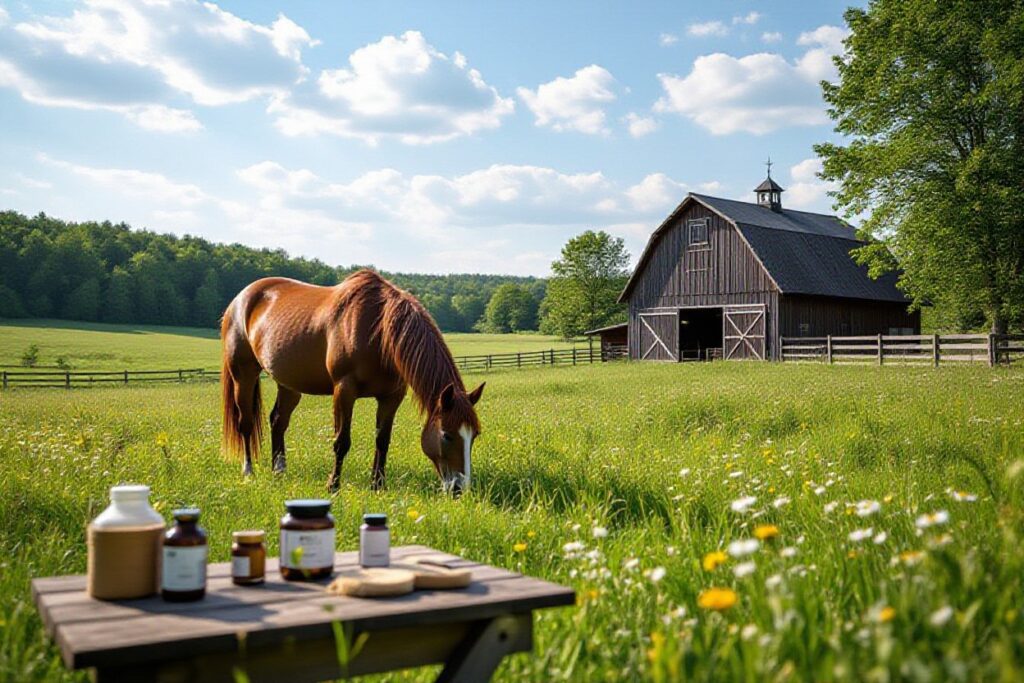Most crucial to your horse’s well-being is the quality of the water you provide. Clean, fresh water is necessary for proper hydration, digestion, and overall health of your horse. Poor water quality can lead to serious health issues such as colic, dehydration, and organ failure. By understanding and prioritizing water quality, you are safeguarding the health and well-being of your beloved horse.

The Role of Water in Horse Health
A
Hydration and Digestion
Health: Proper hydration is necessary for your horse’s health and well-being. Water plays a critical role in digestion, helping to break down food and absorb nutrients efficiently. Insufficient water intake can lead to digestive issues such as impaction colic and dehydration.
Hydration: Make sure your horse has access to clean, fresh water at all times. On average, a horse should drink 5-10 gallons of water per day, but this can vary depending on factors like diet, activity level, and weather conditions. Monitor your horse’s water intake and consult with a veterinarian if you notice any changes in drinking habits.
Circulation
Temperature Regulation and Circulation
Circulation: Water plays a crucial role in regulating your horse’s body temperature and supporting circulation. It helps to dissipate heat through sweating and aids in maintaining **optimal** blood flow to the muscles and organs. Dehydration can impair circulation and lead to overheating, especially during **hot** weather or intense exercise.
| Benefit | Importance |
| Regulates body temperature | Essential for preventing heat stress and exhaustion |
| Supports circulation | Crucial for delivering oxygen and nutrients throughout the body |
It is crucial to ensure that your horse has access to **clean** and **ample** water to support optimal temperature regulation and circulation. **Monitor** your horse for signs of dehydration, such as **lethargy** or **dark** urine, and take **prompt** action to ensure your horse’s **health** and **well-being**.

Water Quality Parameters
pH Levels and Alkalinity
Parameters such as pH levels and alkalinity play a crucial role in determining the quality of water for your horses. pH levels indicate the acidity or alkalinity of the water. **A pH level below 6.5 can cause corrosion in your horse’s watering system and lead to health issues, while a pH above 8.5 can make the water taste unpleasant and decrease its palatability**.
Hardness and Mineral Content
For your horses’ health, understanding the hardness and mineral content of the water they consume is imperative. **Hard water, which contains high levels of minerals such as calcium and magnesium, can contribute to health problems such as mineral imbalances and kidney stones in horses**.
It is important to test your water source for hardness and mineral content to ensure your horses are receiving clean and safe drinking water.
Bacteria and Pathogen Presence
For the well-being of your equine companions, it is crucial to monitor the presence of bacteria and pathogens in their drinking water. **Contaminated water can lead to illnesses such as colic, diarrhea, and other serious health issues in horses**.

Effects of Poor Water Quality
For horses, the quality of water they consume is crucial for their overall health and well-being. Poor water quality can have several negative effects on your horse.
Dehydration and Digestive Issues
Issues related to poor water quality can lead to dehydration in horses. Dehydration can cause a range of problems, including digestive issues such as impaction colic. When horses are not adequately hydrated, their digestive systems can be compromised, leading to serious health concerns.
Skin and Coat Problems
Water quality directly affects the skin and coat of horses. If your horse is drinking water that is contaminated or of poor quality, it can manifest in their skin and coat. Issues such as dull coat, dry skin, and skin irritations can be linked to inadequate water quality.
Water is necessary for maintaining healthy skin and a shiny coat in horses. Proper hydration supports the natural oils in the skin, contributing to a healthy and lustrous coat. Therefore, ensuring your horse has access to clean and high-quality water is vital for their external health.
Increased Risk of Disease
Digestive issues and a weakened immune system due to poor water quality can result in an increased risk of disease for your horse. When a horse’s body is under stress from contaminated water sources, it becomes more susceptible to illnesses and infections.
Any disturbance in the delicate balance of a horse’s internal systems can pave the way for diseases to take hold. Ensuring that your horse has access to clean and safe drinking water is crucial in preventing potential health issues.
Factors Affecting Water Quality
Your horse’s health and well-being depend on the quality of water they consume. Understanding the various factors that can affect water quality is crucial in ensuring your horse remains healthy and happy.
Source and Treatment Methods
Any impurities, contaminants, or pollutants in the water source can have a direct impact on your horse’s health. It is crucial to know where your horse’s water is coming from and the treatment methods used to make it safe for consumption. Ensuring the water is free from harmful substances is key to providing your horse with clean and safe drinking water.
Storage and Distribution Systems
Factors such as the type of storage containers used, the cleanliness of the troughs, and the maintenance of the distribution system can all influence the quality of the water your horse drinks. It is crucial to regularly clean and inspect the water storage and distribution systems to prevent contamination and ensure fresh, clean water for your horse.
The cleanliness of the water troughs and the maintenance of the entire water distribution system are crucial in providing your horse with access to clean, uncontaminated water at all times. Regular cleaning and proper maintenance of these systems are vital in safeguarding your horse’s health.
Environmental Factors and Contamination
- Pesticides
- Industrial waste
Affecting the water quality that your horse consumes are environmental factors such as pesticides, industrial waste, and other pollutants. These contaminants can have detrimental effects on your horse’s health if ingested. It is crucial to be aware of these potential contaminants and take measures to minimize their impact on your horse.
- Bacteria
- Heavy metals
Plus, monitoring the presence of bacteria, heavy metals, and other harmful substances in the water sources can help you take proactive steps to ensure your horse is drinking clean and safe water. Regular testing and proper water management practices are crucial in safeguarding your horse’s health and well-being.
Monitoring and Testing Water Quality
Laboratory Analysis and Testing
To ensure the optimal health of your horses, it is necessary to conduct laboratory analysis and testing of your water sources regularly. These tests can provide valuable insights into the chemical composition of the water, including levels of contaminants such as heavy metals, nitrates, and bacteria. By monitoring these factors, you can take proactive steps to address any water quality issues that may arise.
Visual Inspection and Observation
To complement laboratory testing, visual inspection and observation of your water sources are also crucial. By regularly checking for signs of contamination such as discoloration, floating debris, or foul odors, you can quickly identify any potential water quality problems that may affect your horses’ health.
With visual inspection and observation, you can catch any issues early on and take the necessary steps to rectify them, ensuring that your horses always have access to clean and safe water.
Regular Maintenance and Record Keeping
Record-keeping is necessary when it comes to monitoring water quality for your horses. By maintaining detailed records of water test results, observations, and maintenance activities, you can track any trends or changes in your water quality over time. This information can be invaluable for identifying and addressing any issues promptly.
Quality water management is an ongoing process, and by staying diligent with regular maintenance and record-keeping, you can ensure that your horses always have access to clean and safe drinking water.

Improving Water Quality for Horses
Now, to ensure **your** horses have access to clean and safe drinking water, it is necessary to implement effective treatment systems on **your** property.
Implementing Effective Treatment Systems
With the installation of water filtration and purification systems, **you** can significantly reduce the presence of harmful contaminants such as bacteria, parasites, and heavy metals in the water sources available to **your** horses. These systems work to improve water quality by removing impurities and ensuring that the water **your** horses consume is free from potentially harmful substances.
Maintaining Clean and Sanitary Storage
Systems for storing water should be kept clean and well-maintained to prevent the growth of algae, bacteria, and other contaminants that can compromise water quality. Regularly cleaning water tanks and troughs, as well as ensuring that they are properly covered to prevent debris and animals from contaminating the water, is necessary for **your** horse’s health and well-being.
Another crucial aspect of maintaining clean and sanitary water storage is to regularly monitor and test the water quality to ensure that **your** horses are not exposed to any potential hazards. This can be done through simple water testing kits that are readily available and easy to use, providing **you** with peace of mind knowing that the water **your** horses are consuming is safe and clean.
Providing Access to Fresh Water
Quality access to fresh water is vital for **your** horses’ overall health and performance. Ensure that **your** horses have access to clean water at all times, especially during hot weather or periods of increased physical activity. **Your** horses should be able to drink freely whenever they need to, promoting hydration and well-being.
Access to clean and fresh water is necessary for **your** horse’s digestion, temperature regulation, and overall health. Make sure that **your** horses’ water sources are regularly checked and refilled to guarantee a constant supply of fresh, clean water for **your** animals.
Conclusion
With these considerations in mind, it is clear that maintaining good water quality is vital for the health of your horses. Poor water quality can lead to a host of health issues, ranging from dehydration and colic to more serious conditions like kidney failure. By ensuring that your horses have access to clean, fresh water at all times, you are taking a crucial step in safeguarding their well-being.
Be mindful of, your horses rely on you to provide them with the best possible care, and this includes paying attention to the quality of their water source. By making water quality a priority on your horse farm or stable, you can help prevent a range of health problems and ensure that your horses lead happy, healthy lives.
Q: Why is water quality important for horse health?
A: Water quality is crucial for horse health because it affects their hydration, digestion, and overall well-being. Clean and fresh water helps prevent diseases and improves the horse’s performance.
Q: How often should a horse’s water source be checked for quality?
A: A horse’s water source should be checked daily for quality. It is important to ensure that the water is clean, free of contaminants, and at an appropriate temperature for the horse to drink.
Q: What are the signs of poor water quality affecting a horse’s health?
A: Signs of poor water quality affecting a horse’s health can include decreased water intake, dehydration, colic, weight loss, dull coat, and behavioral changes. Regular monitoring of water quality can help prevent these issues.
Q: How can horse owners improve water quality for their horses?
A: Horse owners can improve water quality by using clean and well-maintained water sources, regularly cleaning water troughs and buckets, providing fresh water daily, and ensuring that the water is free from chemicals or toxins.
Q: What are the potential risks of poor water quality for a horse’s health?
A: Poor water quality can lead to dehydration, digestive problems, kidney issues, and overall compromised health in horses. It can also increase the risk of diseases and infections, impacting the horse’s performance and well-being.










